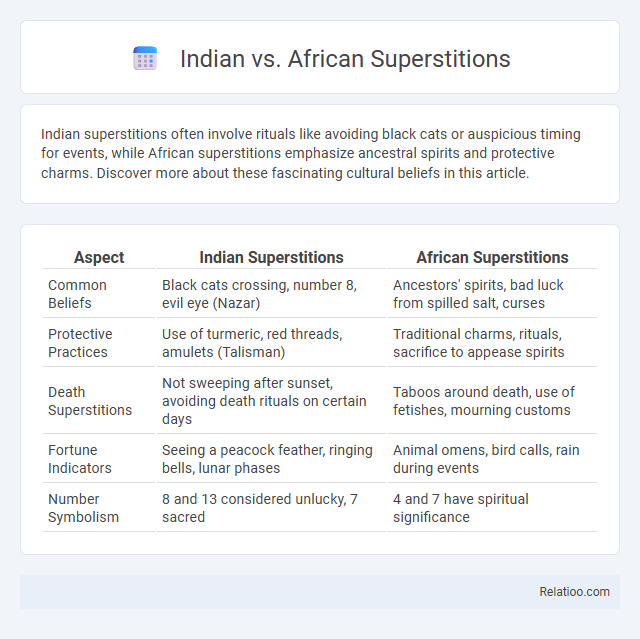Indian superstitions often involve rituals like avoiding black cats or auspicious timing for events, while African superstitions emphasize ancestral spirits and protective charms. Discover more about these fascinating cultural beliefs in this article.
Table of Comparison
| Aspect | Indian Superstitions | African Superstitions |
|---|---|---|
| Common Beliefs | Black cats crossing, number 8, evil eye (Nazar) | Ancestors' spirits, bad luck from spilled salt, curses |
| Protective Practices | Use of turmeric, red threads, amulets (Talisman) | Traditional charms, rituals, sacrifice to appease spirits |
| Death Superstitions | Not sweeping after sunset, avoiding death rituals on certain days | Taboos around death, use of fetishes, mourning customs |
| Fortune Indicators | Seeing a peacock feather, ringing bells, lunar phases | Animal omens, bird calls, rain during events |
| Number Symbolism | 8 and 13 considered unlucky, 7 sacred | 4 and 7 have spiritual significance |
Origins of Indian and African Superstitions
Indian superstitions often stem from ancient Vedic scriptures, astrology, and traditional Hindu beliefs emphasizing karma, auspicious timing (muhurat), and spiritual rituals to ward off evil spirits. African superstitions originate from indigenous animistic religions, ancestor worship, and tribal customs that interpret natural phenomena and spiritual forces as influences on daily life. Both sets of superstitions are deeply rooted in cultural heritage and reflect the civilizations' historical attempts to explain and control the unknown through ritualistic practices.
Cultural Significance of Superstitions
Indian superstitions, deeply rooted in ancient Vedic traditions and Hindu mythology, play a vital role in shaping cultural rituals and everyday practices, often symbolizing divine protection and societal harmony. African superstitions, intertwined with ancestral worship, nature spirits, and tribal folklore, guide moral conduct and community cohesion, reflecting a profound connection with the spiritual world. Both cultures utilize superstitions as frameworks for understanding life events, influencing festivals, family customs, and social behavior, thereby preserving cultural identity and continuity.
Common Indian Superstitions
Common Indian superstitions often revolve around astrology, auspicious timings (muhurat), and rituals to ward off evil spirits, reflecting a deep cultural intertwining with religion and tradition. African superstitions frequently emphasize ancestral worship, protective amulets, and natural elements believed to influence fate and fortune. While both cultures share beliefs in the supernatural, Indian superstitions are distinctly characterized by their complex ceremonies and reliance on celestial events.
Common African Superstitions
Common African superstitions often involve beliefs in ancestral spirits, protection charms, and the power of rituals to influence fate, reflecting deep cultural connections to nature and the supernatural. In contrast, Indian superstitions frequently incorporate astrology, karma, and auspicious symbols like the swastika or peepal tree to guide daily life and decisions. Your understanding of these shared and unique practices reveals how superstition shapes behaviors and traditions across diverse African and Indian communities.
Religious Influences on Superstition Beliefs
Indian superstitions are deeply influenced by Hinduism, incorporating beliefs in karma, astrology, and rituals aimed at warding off evil spirits or bad luck, often linked to deities such as Hanuman and Ganesha. African superstitions reflect diverse indigenous religions and ancestral worship, emphasizing spiritual forces, witchcraft, and rituals to maintain harmony between the physical and supernatural worlds. Religious influences shape these superstitions, blending traditional faiths with cultural practices to explain misfortune and ensure protection and prosperity.
Superstitions in Daily Life: India vs Africa
Superstitions in daily life vary significantly between India and Africa, reflecting distinct cultural beliefs and traditions. In India, common superstitions include the belief in auspicious and inauspicious times for activities, the need to ward off the evil eye with charms, and rituals during festivals to ensure prosperity. African superstitions often involve ancestral spirits, the significance of totems, and protective rites to shield your home and family from harm.
Similarities between Indian and African Superstitions
Indian and African superstitions share common themes such as belief in spirits, the influence of ancestors, and the use of rituals for protection against evil forces. Both cultures emphasize symbolism in amulets and charms to ward off bad luck and promote health and prosperity. Your understanding of these similarities highlights the universal nature of human attempts to explain and control the unknown through superstition.
Differences in Superstitious Practices
Indian superstitions often revolve around astrology, rituals tied to religious festivals, and beliefs in karma affecting daily life, whereas African superstitions emphasize ancestral spirits, nature-based omens, and the spiritual significance of animals. Your experience may differ as Indian practices commonly involve complex ceremonies with idols and astrology charts, while African superstitions frequently incorporate drumming, dance, and herbal remedies as part of spiritual protection. These distinctions highlight how cultural context shapes the expression and purpose of superstitions across regions.
Impact of Superstitions on Society
Indian and African superstitions significantly shape cultural practices, influencing societal behavior and decision-making in health, relationships, and community rituals. Your understanding of these beliefs reveals how superstition can drive both positive social cohesion and negative outcomes such as discrimination and fear. Recognizing the impact of superstition helps address irrational fears and promotes a more rational, informed society.
Changing Perspectives on Superstitions
Indian superstitions, deeply rooted in cultural rituals and astrology, have evolved with increased scientific awareness and urbanization, leading to a gradual shift towards rationality. African superstitions, often intertwined with indigenous beliefs and ancestral worship, are experiencing transformation as education spreads and modern healthcare gains acceptance. Changing perspectives on superstitions reflect a global trend where traditional beliefs are being reassessed amidst contemporary values and empirical understanding.

Infographic: Indian vs African Superstitions
 relatioo.com
relatioo.com